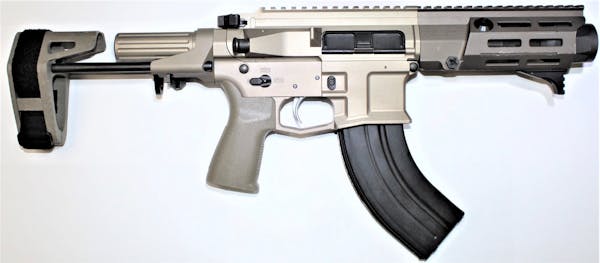The commodities price swoon hasn't just cut the number of North Dakota oil rigs and the price of fuel.
In the behind-the-scenes-but-important business of collecting, fixing and recycling tons of used electronics, a big player closed its St. Paul plant several days ago. The plant processed several million pounds of business equipment annually.
Denver-based Arrow Electronics, one of the country's largest electronics recyclers, told its mostly business customer base that it would still truck their old equipment to an Ohio plant. But that would come at a premium rate.
Two things are at play here.
First, recyclers, small and large, are coping with commodity prices for steel, aluminum, copper and other metals that are down by as much as 50 percent from their recent peaks.
And Arrow, which recycled nearly 110 million pounds of "e-waste" last year, is a deep-pockets consolidator that is trying to get more efficient by merging operations at strategic locations. Arrow has acquired 35 smaller companies since 2010, including St. Paul-based Asset Recovery three years ago.
John Hourigan, a Denver-based vice president for Arrow, declined to discuss the specifics or economics of the shuttered St. Paul plant, other than to say the Asset Recovery acquisition deepened Arrow in the "asset disposition," business, the stripping products down to recyclable commodities. Arrow is focusing more on higher-value product refurbishment and other services in core markets.
Meanwhile, Minnesota is capturing, reusing and recycling more electronics, up to 35 tons this year. And smaller, flexible competitors are stepping up to fill the void left by Arrow.
"The last few days have been like Christmas since Arrow shut down in St. Paul," said Mike Satter, an executive with OceanTech, a computer-and-electronics collector that refurbishes and sells more than two-thirds of what it gets from data centers, offices and consumers. "We closed six deals alone on Monday with business customers of Arrow.
"We employ 48 people [in northeast Minneapolis] and Eden Prairie. We need to hire eight more people in the warehouse, which we are expanding, and six people in sales. Right now."
OceanTech now forecasts that it will grow from handling 3.5 million pounds of equipment in 2014 to 5 million this year, a better than 40 percent rise.
Arrow was known in this market for equipment that stripped metals more than refurbishing and resale.
"They were making a lot of money when prices of precious metals were high," Satter said. "But prices went down and it's like North Dakota and oil. Our model is to take equipment in and refurbish and sell it. You get more value that way."
Garth Hickle, a veteran "product stewardship" manager at the Minnesota Pollution Control Agency, said the recycling market "has been rocked by [lower] commodity products and Arrow and Waste Management pulled back locally. A few tiny players also exited the market."
However, other players are stepping up and an increasing percentage of business equipment is being refurbished and resold by the likes of OceanTech and Tech Dump, another growing electronics recycler.
It's less profitable for recyclers to collect electronics because of lower commodity prices. Under an eight-year-old Minnesota law, however, manufacturers, including such big retailers as Best Buy who sell their own private-label electronics, are required to accept an amount equivalent to 80 percent of what they manufacture and sell annually.
And these operations have the deep pockets and staying power to transcend market swings.
Hickle estimated that in consumer electronics alone, Minnesota went from recycling about 20 million pounds annually to more than 35 million pounds annually. Best Buy takes in about 10 million pounds of that through its store-recycling programs.
Jerry Powell, the decades-long editor of Oregon-based Resource Recycling publications that cover the $20 billion-plus industry, said Arrow and other large companies, including Waste Management, over-invested in recycling capacity and can't please shareholders amid strong local competition from lower-cost operators and lower prices.
"Overcapacity is a national issue," Powell said. "Arrow bought their way into the business in some markets. Sims Recycling, a giant recycling company out of Australia, has shut down four North American plants.
"Plastic and metals prices are down and industrial production is flat because of the strength of the U.S. dollar [depressing exports]. Big companies are reducing their plant capacity and footprint. I just wonder if electronics recycling has the margins for large public companies. Local players who can stand to make a lower return on investment will survive."
A growing group of regional recyclers is achieving industry-government standards for environmental practices, handling and securing and destroying old data.
Tom McCullough, executive director of Tech Dump a Golden Valley-based recycler that, fortuitously, in light of the Arrow retreat, opened a big plant in St. Paul's Midway last year, said his company is expanding despite commodity price declines because of increased sales of refurbished products and growing relationships with business customers. Its clients include Activision, Cummins, and Aimia, General Mills, Cargill, area school districts, government agencies, and municipalities.
"We take calls every day for new business," McCullough said. "Our business doubled last year and we'll increase 30 to 40 percent this year. Consolidation is part of that. Plus people are more aware of the [recycling] law and their responsibility. We cash flow and we are profitable from operations. We've grown from 25 people last year to 50 by the end of this year.
"Our repurposing business is growing rapidly. It's more efficient than tearing down products. A lot of buyers are small businesses, nonprofits and individuals who may want to buy a laptop for $150 instead of a new one $500."
Neal St. Anthony • 612-673-7144 • nstanthony@startribune.com
